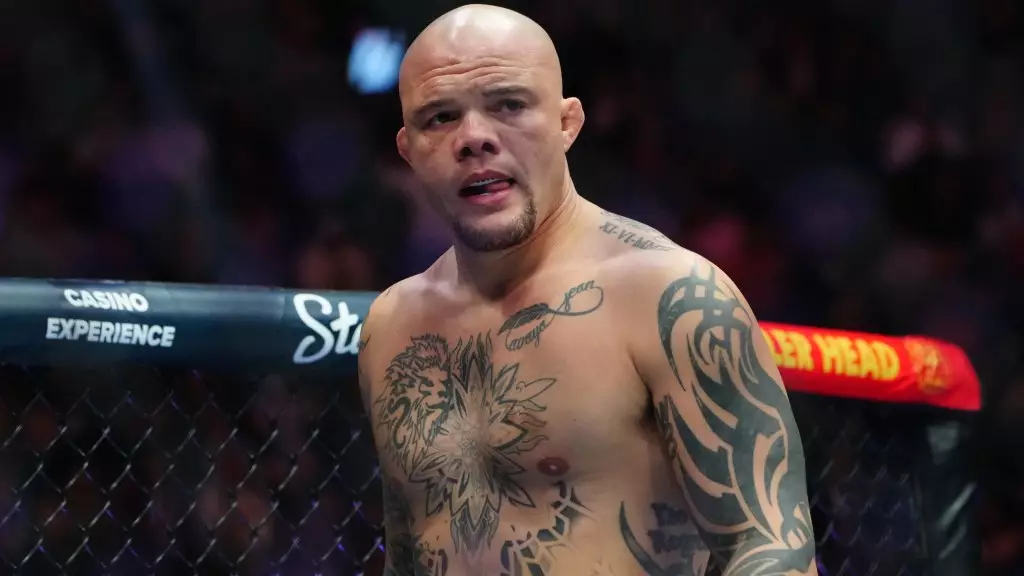When we think of mixed martial arts, the immediate image that often comes to mind is that of physical prowess, unwavering determination, and an indomitable spirit. Fighters like Anthony Smith embody these traits, yet the reality behind their strength can be far more complex. Smith’s recent bout at UFC 310 against Dominick Reyes offers a poignant example of how personal struggles can filter into professional arenas, affecting performance and mental well-being.
At the T-Mobile Arena in Las Vegas, the atmosphere was electric with the anticipation of the UFC 310 fight card. However, for Anthony Smith, the weight of personal tragedy loomed large. Just prior to the fight, he had experienced the profound loss of his friend and coach, Scott Morton. This emotional burden became evident as Smith walked to the octagon, choking back tears, a testament to the psychological challenges many athletes face. In post-fight interviews, he openly acknowledged his emotional state at the time of the fight, stating, “I handle things really well, but this one is tough. I’ve never struggled like this before.” The fragility of his mental state raises questions about the expectations placed on fighters to simply ‘power through’ adversity as if it were an inherent part of their profession.
This duality — the expectation to remain stoic in the face of personal grief — can be exceptionally debilitating. Athletes are often celebrated for their toughness, yet their vulnerability tends to be overlooked. Smith’s admission about knowing he was not in the right frame of mind to compete invites a deeper conversation about mental health in sports, particularly in high-stakes scenarios like the UFC.
As the bout progressed, Smith’s frustrations became evident, not only to him but also to Reyes, who later recounted an unsettling exchange where Smith dropped his hands and implored his opponent to strike him. This accusatory invitation stemmed from Smith’s overwhelming sense of impatience. “I just wanted something to f*cking happen,” he explained. Such moments of impatience can lead fighters to make perilous decisions inside the octagon, compounding the risk of injury and defeat.
Moreover, Smith’s reflections on his capabilities reveal an unsettling realization: a moment of self-doubt. “Maybe I’m not either anymore,” he mused, highlighting how high-pressure situations can cause even the most seasoned athletes to question their skills. This level of introspection is crucial, especially as it illustrates the personal accountability executives and fans often neglect to consider. Athletes are not merely warriors; they are individuals who contend with both their physical limitations and mental health challenges.
In the aftermath of the fight, Smith expressed a willingness to potentially have one last fight, driven by a desire for a fitting send-off. This sentiment resonates with many athletes who crave closure and the opportunity to leave the sport on their own terms. “There’s a circumstance that probably exists where I would do one more,” he stated, emphasizing that it would have to align with the perfect timing, opponent, and situation. The looming prospect of retirement often brings mixed emotions, as athletes process their legacy and the impact they wish to leave behind.
In a sport characterized by brutal competition, it is essential to not only celebrate the triumphs but also acknowledge the struggles fighters endure. As Smith contemplates his future in the UFC, the narrative goes beyond victory and defeat. It envelops the importance of mental health, the quest for closure, and the need for support from a community that often only sees the fighter within the cage.
Anthony Smith’s experience at UFC 310 serves as a reminder that fighters are first and foremost human beings grappling with loss, confusion, and immense pressure. The journey of an athlete encompasses far more than the bouts they compete in; it often reflects the broader human experience of resilience, loss, and the pursuit of meaning in one’s contributions, both inside and outside the fighting arena.

